Whether you're looking to relax after a long day or chase away tiredness, therapeutic teas can greatly help. The best therapeutic teas, not only have the usual health benefits associated with tea drinking (such as reducing stress and improving concentration), but some of these varieties also offer specific therapeutic properties that are beneficial for specific ailments or conditions.
The Best Therapeutic Teas
In this blog post, I will try to cover as many types of therapeutic teas as possible and the benefits they bring to the human body when consumed.
Please watch the video: What Are The Best Therapeutic Teas?

What Are The Best Therapeutic Teas?
Here are a few of our favorites, presented only as points of attraction, I will detail them below…. :
- chamomile is known for its calming and healing properties, especially when it comes to anxiety and insomnia.
- lavender has been shown to be effective in reducing stress levels, improving moods, easing pain symptoms, and helping with relaxation.
- rosehip tea is an anti-inflammatory compound which makes it beneficial for overall health. It also helps promote better digestion by enhancing the production of bile acids.
- Finally, minty green tea is excellent for fighting inflammation because of its high level of catechins.
Why should we drink tea every day?
Temperature changes and very low degrees give rise to numerous viruses that we hardly face. Drug treatments are not always an inspired choice. Fight colds, flu, and viruses with natural remedies. Teas are within everyone's reach, in addition, they represent a natural adjuvant for strengthening the immune system.
Please watch the video: What Are The Best Therapeutic Teas?

The Best Therapeutic Teas
What does the body need to stimulate immunity?
Omega-3 essential fatty acids: they have the role of reducing the incidence of cardiovascular diseases, improving the symptoms of autoimmune diseases, and stimulating the immune system.
Antioxidant vitamins. Vitamins A, C, and E have the greatest impact on the efficiency of the immune system. They are antioxidants, that is, they prevent the oxidative reactions in the body from exerting their harmful action on the cells. In other words, it prevents free radicals, acting as a shield.
The minerals. Micronutrients such as zinc, selenium, copper, and iron are essential for the proper functioning of the immune system. They are important and their action is visible, even in cases where they are found in small quantities in the food we eat.
Phytonutrients - The beneficial active substances from fruits, vegetables, grains, and plants are called phytonutrients. These have the role of protecting plants from the action of pollution, numerous diseases, and ultraviolet rays. By consuming foods rich in phytonutrients, we transfer this action to our bodies.
Please watch the video: What Are The Best Therapeutic Teas?

What Are The Best Therapeutic Teas?
What are the best teas for us?
Green Tea
There are many purported benefits of green tea, including weight loss, improved cardiovascular health, and reduced risk of cancer.
Green Tea contains catechins, which are a type of antioxidant that help to protect the body against harmful toxins and scavenge harmful free radicals. Additionally, polyphenols present in Green Tea have anti-inflammatory and anti-cancer properties. It has also been shown to improve cardiovascular health.
Please watch the video: What Are The Best Therapeutic Teas?
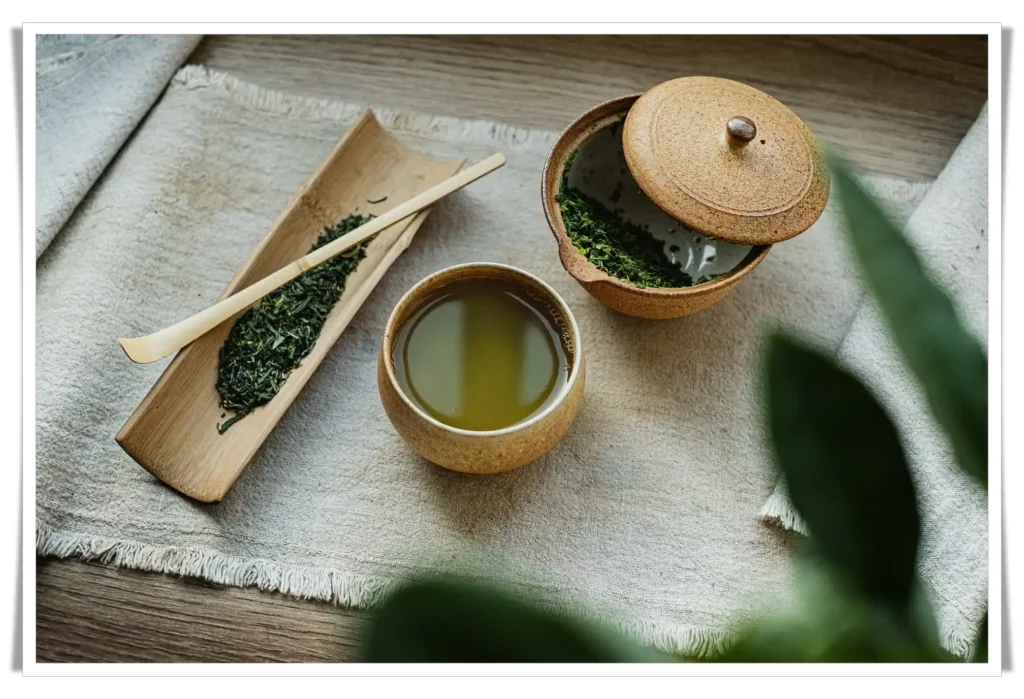
What Are The Best Therapeutic Teas?
One study showed that those who drank Green Tea regularly had a lower risk of dying from cardiovascular disease. This can be traced back to the fact that Green Tea helps in improving lipid levels, lowering blood pressure, and reducing inflammation.
Not to forget, it is your best friend on a weight loss diet! Green Tea can increase metabolism and burn more calories. This zero-calorie drink can also aid in suppressing the appetite.
Many of the anti-ageing effects of green tea are due to flavan-3-ols, a type of flavonoid found in green tea, but also in other teas. Also, according to the researchers, the polyphenols found in tea are called catechins, which have the strongest antioxidant effects. Green tea contains four types of substances derived from catechins, as follows:
- epicatechin
- epigallocatechin
- epicatechin gallate (ECG)
- epigallocatechin-3-gallate (EGCG)
One of the most famous compounds of green tea is called epigallocatechin-3-gallate (EGCG). EGCG has the important role of preventing weight gain or helping to maintain a healthy weight. It seems that EGCG increases thermogenesis in the body (this being the rate at which the body burns calories) and reduces appetite.
In addition, green tea contains many other protective compounds, such as:
Please watch the video: What Are The Best Therapeutic Teas?

What Are The Best Therapeutic Teas?
- linoleic acid
- methylxanthines, such as caffeine, theophylline, and theobromine
- quercetin
- agenine
- different amino acids and enzymes (proteins represent approximately 15%-20% of the weight of the leaves)
- carbohydrate molecules, such as glucose, fructose, sucrose, cellulose, and pectins
- small amounts of minerals and trace elements such as magnesium, calcium, chromium, iron, manganese, copper, and zinc
- chlorophyll and carotenoids
- volatile compounds such as alcohols, aldehydes, lactones, esters, and hydrocarbons.
The benefits of green tea:
May reduce appetite
Green tea can reduce appetite and prevent fat accumulation by inhibiting angiogenesis, the process by which new blood vessels are formed in the body, and, at the same time, the process on which the growth of adipose tissue depends.
Skin benefits
According to some studies, green tea, through its main component, epigallocatechin-3-gallate (EGCG), has demonstrable anti-inflammatory properties.
Please watch the video: What Are The Best Therapeutic Teas?

What Are The Best Therapeutic Teas?
This was demonstrated following a 2019 analysis of the use of green tea extract in cosmetic products. Researchers found that products containing green tea extract elicited anti-inflammatory responses when applied topically. In addition, they found out that the microcirculation in the skin improved in the affected areas.
Benefits for the heart
According to a study conducted in 2006, drinking green tea can reduce mortality caused by cardiovascular diseases.
More than 40,000 Japanese participants between the ages of 40 and 79 took part in this study. The study started in 1994 and lasted for 11 years. Specialists discovered that people who drank at least five cups of green tea per day had a reduced risk of mortality due to cardiovascular diseases.
This discovery was also supported by an analysis carried out in 2016 regarding green tea and cardiovascular diseases. Nine studies involving 259,267 people were included in the analysis. According to the researchers, the consumption of green tea caused favorable results regarding the risk of cardiovascular and ischemic diseases.
Green tea reduces cholesterol levels
The consumption of green tea, either in the form of a drink or in the form of a capsule, significantly reduced the level of low-density lipoproteins (or "bad" cholesterol).
Please watch the video: What Are The Best Therapeutic Teas?

What Are The Best Therapeutic Teas?
It may reduce the risk of stroke
Regular consumption of green tea or coffee appears to be associated with a reduced risk of stroke.
Following a study conducted by the American Heart Association (AHA), it was shown that green tea consumed daily can positively influence the risk of stroke.
Benefits for patients with type 2 diabetes
Studies on the link between green tea and diabetes have given mixed results.
Some research has shown that people who drink green tea have a lower risk of type 2 diabetes. After 17 controlled studies, a link was found between green tea consumption and reduced fasting glucose and insulin levels.
Also, another analysis on polyphenols carried out in 2017, demonstrated that people from the Mediterranean area, who drink green tea regularly, have a reduced risk of developing type 2 diabetes.
Jasmine tea
Please watch the video: What Are The Best Therapeutic Teas?

What Are The Best Therapeutic Teas?
Jasmine is a plant cultivated and appreciated by people for millennia, famous for its beautiful white flowers and special perfume. People adore the flower for its strong and sweet smell. In addition, many cosmetic manufacturers around the world include jasmine in aromatic products such as candles, perfumes, soaps, and lotions.
Please watch the video: What Are The Best Therapeutic Teas?

What Are The Best Therapeutic Teas?
The benefits of jasmine tea
Increases energy levels
As I mentioned, jasmine tea manufacturers use other types of tea as a base, such as green, black, or white. These teas are obtained from the leaves of the Camellia sinensis plant, which contains caffeine. The caffeine content of jasmine tea can vary depending on the type of tea used as a base, although green tea is the most used. A cup of green tea contains about 35 mg of caffeine, while a cup of coffee contains about 95 mg.
Switching from coffee to jasmine tea can reduce your caffeine intake while still giving you energy for the whole day.
Please watch the video: What Are The Best Therapeutic Teas?
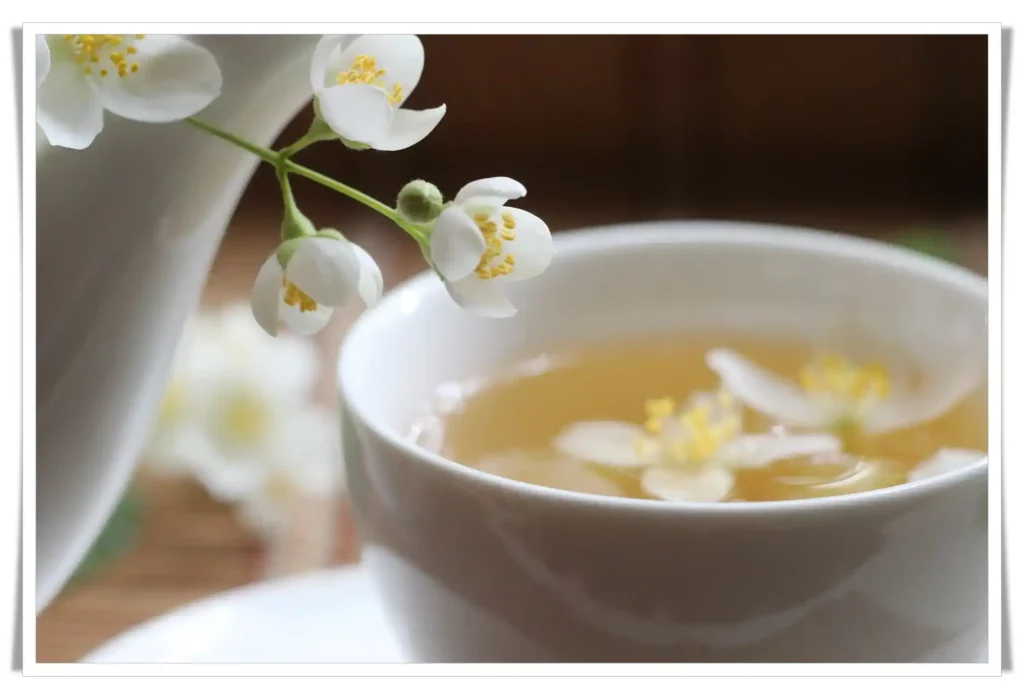
What Are The Best Therapeutic Teas?
Jasmine tea - helps with the weight loss process
The process of losing weight can be difficult, so a little extra support can go a long way. If you choose to drink jasmine tea to lose weight, know that this liquor can speed up your metabolism due to its green tea content. A faster metabolism means faster processing of nutrients and macronutrients (such as fats and proteins), and this leads to weight loss.
It protects the heart
To live longer and better it is vital to keep your heart healthy. You can drink a few cups of jasmine tea a day to reduce the risk of serious diseases.
Jasmine tea contains antioxidants that keep the heart healthy. A high level of LDL cholesterol can increase the risk of strokes, blood clots, and heart attacks.
The catechins found in jasmine tea can reduce LDL cholesterol, which can cause inflammation of the arteries and veins.
Jasmine tea - anti-stress remedy
The delightful aroma of tea can directly influence two of the body's five senses, and this can improve mood.
According to studies, the state of relaxation is deeply influenced by the sense of smell. The fragrant aroma of jasmine tea can trigger a response in the parasympathetic system, which releases chemicals that help the body relax.
Please watch the video: What Are The Best Therapeutic Teas?

What Are The Best Therapeutic Teas?
Of course, the taste is also affected by the jasmine tea. The sweet aroma of jasmine induces a state of relaxation that can soothe you after a long day.
It can protect against Alzheimer's and Parkinson's diseases
Jasmine tea is rich in polyphenols, which can reduce the risk of Alzheimer's and Parkinson's diseases.
In particular, green tea-based jasmine tea is rich in epigallocatechin gallate (EGCG), a polyphenol that can reduce inflammation and neutralize damage caused by free radicals - two factors in Alzheimer's and Parkinson's diseases.
It can help prevent type 2 diabetes
Type 2 diabetes occurs due to the inability of the body to regulate or produce insulin. The main causes of diabetes are genetic factors and unhealthy lifestyles or a combination of the two.
Drinking jasmine tea can regulate insulin levels, which helps to control or prevent diabetes.
Improves the immune system
Like most teas, jasmine tea has anti-inflammatory and antioxidant properties that help strengthen the immune system and protect against colds and flu. Jasmine tea also contains large amounts of vitamins and minerals that strengthen the immune system.
Please watch the video: What Are The Best Therapeutic Teas?

What Are The Best Therapeutic Teas?
It relieves pain
Jasmine tea, which is based on green tea, has anti-inflammatory properties that help relieve pain caused by arthritis or joint pain, in general. A study conducted by the American College of Rheumatology showed that epigallocatechin gallate from green tea leaves could reduce the painful inflammation caused by rheumatoid arthritis.
Rooibos tea
Rooibos (tea, pronounced ROY-boss) is a red herbal tea that comes from the fermented leaves of the Aspalathus linearis shrub, a plant native to South Africa. Many people enjoy it as an alternative to green or black tea. Unfermented rooibos green coffee is also available. Rooibos tea has a sweet and delicate aroma. It contains several antioxidants, which may explain some of its health benefits. In this article, we list the potential health benefits of rooibos tea.
Please watch the video: What Are The Best Therapeutic Teas?
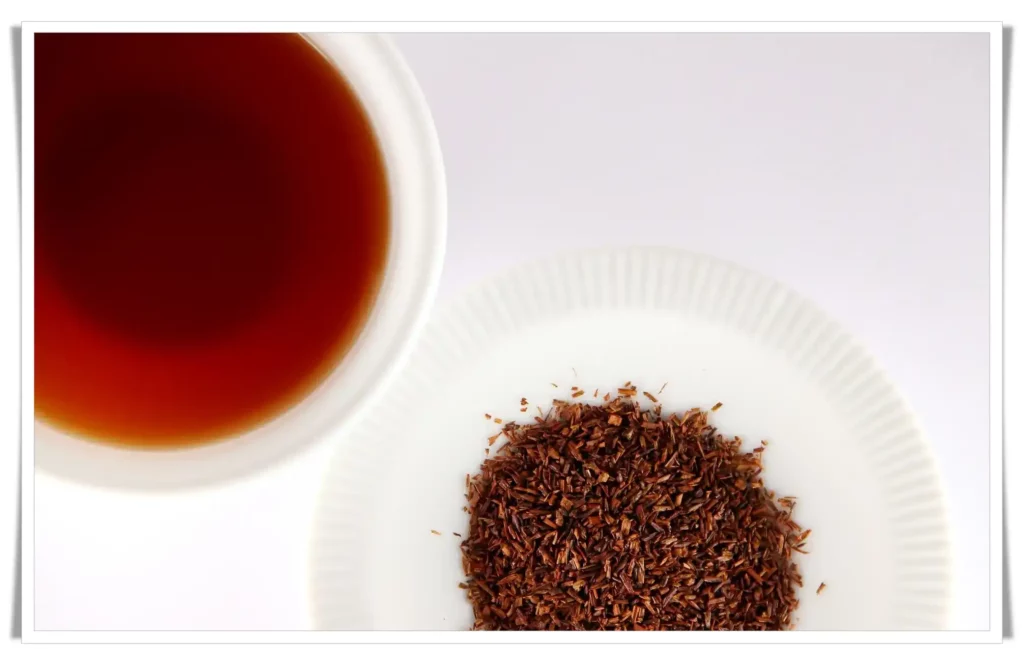
What Are The Best Therapeutic Teas?
Research into the effects of rooibos tea is limited. However, based on existing studies, health benefits include
Benefits of rooibos tea
Does not contain caffeine
Rooibos tea does not contain caffeine, which can make it a good option for pregnant women, children, and those who are sensitive to caffeine. While caffeine may have some health benefits, not everyone can safely consume it. It can interfere with sleep, worsen anxiety, and cause physical effects such as heart palpitations. Caffeine is present in black tea, green tea, and coffee. Rooibos tea is a good alternative for people who would like to reduce their caffeine intake or avoid it altogether.
Low in tannins
Red rooibos tea contains very low levels of tannin. Tannins are natural compounds present in many plant foods, including black tea, green tea, and red wine. Tannins interfere with the absorption of iron, especially the form that comes from plant-based foods.
Please watch the video: What Are The Best Therapeutic Teas?

What Are The Best Therapeutic Teas?
Rich in antioxidants
Rooibos tea contains more antioxidants, with the green variety containing higher levels than the red. Some of the most notable antioxidants in tea are quercetin and aspalathin. Antioxidants are important for human health because they prevent free radicals from destroying cells in the body. Results of an animal study on rooibos tea suggest that it may improve the antioxidant status of the liver. Human studies have found that drinking rooibos tea increases antioxidant levels in the body, but the effects are small and wear off quickly.
However, other research suggests that tea does not affect antioxidant levels in the blood.
Heart health
Antioxidants are important for a healthy heart, which is why rooibos tea may offer cardiovascular benefits. It can also keep cholesterol levels under control. In a 2011 study, 40 people at risk of cardiovascular disease drank six cups of rooibos tea daily for 6 weeks. At the end of this period, participants had significantly reduced low-density lipoprotein, or "bad," cholesterol levels, and significant increases in high-density lipoprotein, or good, cholesterol levels compared to the control group. Rooibos tea may improve heart health by inhibiting the angiotensin-converting enzyme, which increases blood pressure. A small study showed that rooibos tea inhibited ACE activity 30-60 minutes after consumption.
Diabetes management
Rooibos tea can help people with diabetes keep their blood sugar under control and thereby reduce the risk of complications. Animal studies have found that the antioxidant aspalathin, which is present in rooibos tea, has antidiabetic potential. Aspalathin may also help people with diabetes reduce their risk of vascular inflammation and atherosclerosis. People with diabetes are two to four times more likely to die from heart disease than people without diabetes. Research suggests that aspalathin helps suppress vascular inflammation that results from high blood sugar levels. There are low levels of aspalathin in red rooibos tea, but it is more abundant in unfermented green tea.
Please watch the video: What Are The Best Therapeutic Teas?
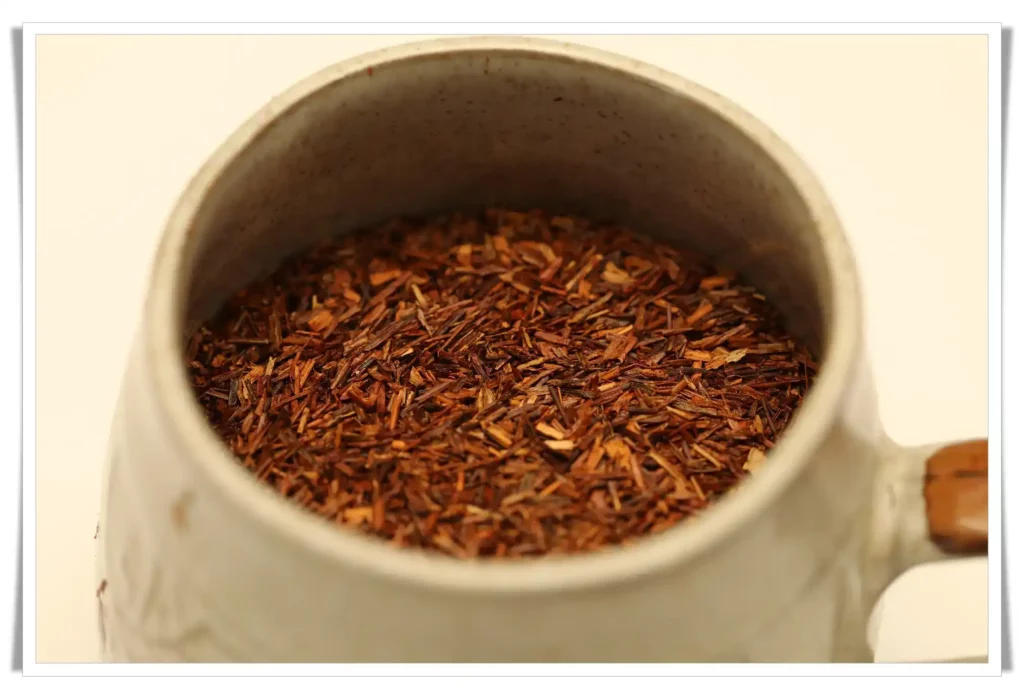
What Are The Best Therapeutic Teas?
Weight management
Rooibos tea is calorie-free, so it can be a good option for those trying to lose weight or maintain a healthy weight. According to the results of a 2014 study, rooibos tea may also benefit weight management by increasing leptin levels. Leptin is a hormone that helps regulate food intake and sends the body signals of satiety when we've had enough food. The tea also stopped the formation of new fat cells and encouraged faster fat burning.
Fewer wrinkles
If a person applies rooibos tea topically, it can improve the appearance of their skin by reducing wrinkles, according to research. A 2010 study compared cosmetic blends of plant extracts in a gel base. The extracts were ginkgo, soy, and a mixture of tea and rooibos. The researchers found that the mixture of tea and rooibos was most effective at reducing wrinkles, while ginkgo was best at moisturizing the skin. However, rooibos tea is unlikely to provide any noticeable skin benefits.
Hibiscus tea
Information about hibiscus tea and the benefits of hibiscus tea leaves has been known since Antiquity. Hibiscus tea, also called "sour tea" is a fragrant tea made from the dried pistil of the tropical flowers of Hibiscus sabdariffa. Hibiscus sabdariffa flowers are native to Africa and grow in many tropical and subtropical regions around the world - including Thailand, China, and Mexico. These flowers are one of the many species of shrubs, trees, and flowers in the mallow family (Malvaceae). Dried hibiscus leaves and flowers contain vitamin C, 20 grams of carbohydrates, and only 79 calories.
Please watch the video: What Are The Best Therapeutic Teas?

What Are The Best Therapeutic Teas?
Hibiscus tea benefits
Hibiscus tea has a fruity, refreshing aroma and many people drink it because of its health benefits. Studies have shown that hibiscus tea is an adjuvant when we talk about immunity, it has a diuretic action, helps to repair cartilaginous tissues, helps to heal skin wounds, and helps to absorb iron in the body.
At the same time, hibiscus tea strengthens the walls of blood vessels and regulates their permeability, reduces the amount of harmful cholesterol in the blood, has an antibacterial effect, and normalizes the digestive system and the liver. In addition, it helps to prevent some types of allergies, as well as helps to eliminate toxins and heavy metals from the body. In other words, hibiscus tea helps with alcohol poisoning. In addition, the elimination of toxins greatly facilitates the process of weight loss and that is why tea made from hibiscus leaves and flowers is an important diuretic.
Please watch the video: What Are The Best Therapeutic Teas?

What Are The Best Therapeutic Teas?
What diseases does hibiscus tea treat?
When we talk about the benefits of hibiscus tea or what diseases hibiscus tea treats, we must know that the leaves and flowers have been used since ancient times. Hibiscus tea can help improve liver health. One study showed that hibiscus tea can help lower markers of liver damage.
At the same time, hibiscus tea also contains polyphenols, which have been proven to have anti-cancer properties. Much of the current research involves studies on different human subjects. A study showed that hibiscus extract limits cell growth and reduces the invasive nature of oral cancer. Other studies have shown that hibiscus tea can help prevent the spread of prostate cancer cells and stomach cancer cells.
Hibiscus tea also has antibacterial properties. It helps to heal in case of infection with E.coli. In addition, ingredients in hibiscus tea make it a powerful natural diuretic. Several studies have shown the potential of hibiscus tea to prevent obesity. One study showed that hibiscus extract reduced body weight, body fat, and body mass index after 12 weeks of treatment.
Please watch the video: What Are The Best Therapeutic Teas?

What Are The Best Therapeutic Teas?
Whether we are talking about loose hibiscus tea or cold hibiscus tea, you need to know when and how to consume this type of tea. It is known, for example, that if you have the habit of eating food rich in carbohydrates, which means a high content of sugar and starch, you are prone to gain weight. Studies show that hibiscus tea reduces the absorption of starch and glucose and thus helps you lose weight. The hibiscus plant has in its composition an enzyme called "phaseolamin" which has the role of reducing the production of sugars, thus contributing to weight maintenance, despite the consumption of carbohydrates, writes alegesanatos.
In addition, the infusions, decoctions, and drinks from these flowers have calming and comforting properties, which combat the effects of stress and are a real help in case of indigestion, and chronic fatigue, but are also adjuvants in periods of recovery of the body after a period of convalescence after certain diseases.
Please watch the video: What Are The Best Therapeutic Teas?

What Are The Best Therapeutic Teas?
And this is not all. Due to its properties, hibiscus can be used successfully for revitalizing the appearance of the skin. Antioxidants neutralize free radicals, thus preventing premature aging of the skin. The anti-aging effect is also intensified by the presence of organic acids (citric, malic, tartaric), which stimulate cell regeneration and collagen synthesis.
When we talk about the benefits of hibiscus tea or ways to prepare hibiscus tea, we need to know some essential aspects. Hibiscus tea helps to reduce cholesterol - hibiscus tea has lipid-lowering, calming, and hypoglycemic properties, considerably reducing "bad" cholesterol in the blood. At the same time, it prevents the destruction of blood vessels and the occurrence of cardiovascular diseases;
Hibiscus tea strengthens the immune system - thanks to the high concentration of vitamin C, hibiscus tea supports the immune system, protects and strengthens it;
Camomile tea
Chamomile is one of the most well-known plants with medicinal properties, being used since Antiquity to treat various problems and ailments. It is prepared either in the form of tea or tincture, but it is also found as an ingredient in a varied range of dermato-cosmetic products.
Chamomile tea is the option most often chosen by most people, having a quick action on the body and being easy to prepare. Here's why you should drink chamomile tea and how you can do it effectively.
Please watch the video: What Are The Best Therapeutic Teas?

What Are The Best Therapeutic Teas?
Chamomile tea: Properties
Chamomile is part of the Asteraceae family and is related to sunflowers and dandelions. The dried flowers of this plant contain over 120 compounds with beneficial effects on the body, including:
Alpha-bisabolol - is present in large quantities in chamomile flowers, being a chemical compound with an anti-inflammatory role. Studies show that it also has antibacterial, anti-irritant, and hypoallergenic properties;
Camazulene - represents a compound present only in chamomile, this being obtained by distilling matricin, an element with anti-inflammatory properties;
Apigenin - is considered to be one of the most important substances found in chamomile tea. According to the information provided by the studies carried out in the field, apigenin has a supporting action in inhibiting the divided and abnormal reproduction of cells - thus, its effects are antiviral, anti-inflammatory, and antioxidant.
In addition, chamomile tea also offers a wide variety of essential oils, but also active substances from the category of flavonoids, coumarins, spinoethers, and terpenoids. This drink is also rich in minerals such as calcium, iron, potassium, zinc, manganese, or sodium, and also contains vitamin A, salicylic acid, and riboflavin.
As adjacent substances, present in smaller quantities, chamomile tea also boasts the presence of luteolin, quercitin, azulene, herniarin, and anthemic acid.
Please watch the video: What Are The Best Therapeutic Teas?
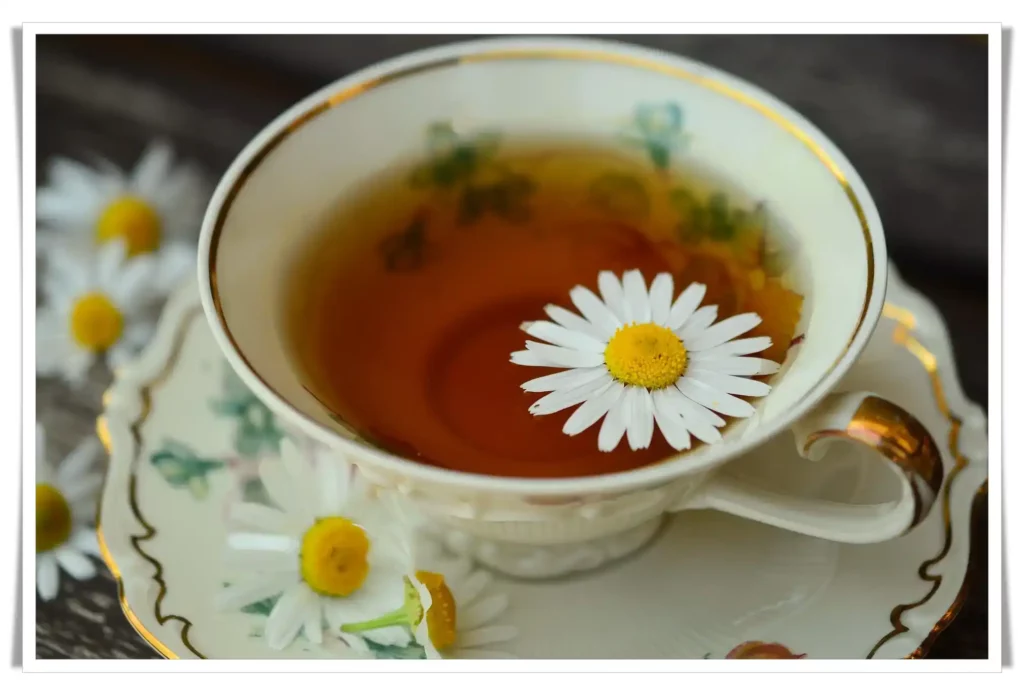
What Are The Best Therapeutic Teas?
The benefits of chamomile tea
Chamomile tea has been used since ancient times to calm digestive problems, having anti-inflammatory and relaxing effects. In terms of external use, it was traditionally used to relieve skin ulcers, irritations, or eczema.
From a scientific perspective, chamomile infusion has several proven benefits for the body:
It supports the health and good functioning of the digestive system
Chamomile tea is one of the quick ways to relieve symptoms of diarrhea or abdominal cramps, according to a study conducted by the Journal of Ethnopharmacology, due to its anti-inflammatory properties. Thus, the regular consumption of this extract can reduce the risk of facing gastrointestinal problems, especially in the case of people who have this predisposition.
Also, the articles published by the Journal of Pharmaceutical Research highlight the possible beneficial effects of chamomile tea in the prevention of stomach ulcers, by reducing gastric acidity and intestinal bacterial colonies.
It contributes to the regulation of the circadian rhythm.
Please watch the video: What Are The Best Therapeutic Teas?

What Are The Best Therapeutic Teas?
Moreover, studies conducted on women who have just given birth to a child show that they rested much better when they consumed chamomile tea before going to bed. The results are compared on subjects who have similar characteristics, but who did not follow the same program with the herbal drink.
It can support the health and optimal functioning of the heart.
Rich in flavonoids, substances with a strong antioxidant effect, chamomile tea is recommended by specialists for people suffering from cardiological conditions. The studies carried out by Journal Circulation attest that flavonoids can reduce blood pressure and maintain cholesterol values in optimal parameters. These are among the two most common causes of cardiovascular problems.
Also, research conducted on several patients suffering from diabetes established that people who consumed chamomile tea at every meal had lower values of LDL cholesterol and triglycerides, compared to those who drank only water.
Cinnamon tea
Cinnamon consumed in the form of tea does not lose its anti-inflammatory properties but is an adjuvant for fighting colds, and viruses, also for improving digestion and regulating tension.
Please watch the video: What Are The Best Therapeutic Teas?

What Are The Best Therapeutic Teas?
Cinnamon contains calcium, iron, manganese, and fiber, and its antibacterial qualities help prevent many types of ailments. Cinnamon tea can be consumed in a variety of ways, along with other healthy ingredients that enhance its health benefits.
Why drink cinnamon tea
Drinking tea at breakfast helps to – stimulate blood circulation, regulate glucose levels, and stimulate brain activity;
Drinking tea at lunch helps to – stimulate digestion and metabolize fats;
Please watch the video: What Are The Best Therapeutic Teas?

What Are The Best Therapeutic Teas?
Consumption in the cold season has an antibacterial and antiviral effect, and improves the immune system; Eating in the hot season can help you healthily lose weight because it helps you get full faster, and thus you will only eat the amount that your body needs.
Cinnamon tea benefits
Cinnamon as an antioxidant:
the anti-oxidants contained in cinnamon can greatly reduce the damage caused by free radicals from cigarette smoke. Add a pinch of cinnamon to black tea and you will get a sensational additional boost in this regard. And because the chemical processes of extracting cinnamon destroy the natural benefits of this product, it is recommended to use cinnamon oil for tea, as it offers a more realistic dose of cinnamon.
It increases cognitive ability, attention, and power of concentration
Cinnamon stimulates brain activity and increases visual-motor speed and auto-response speed, vigilance, memory, and productivity level. This is due to cinnamon's ability to control insulin levels. A recent study demonstrated that the scent or aroma of cinnamon can stimulate brain function. You can also treat certain ailments through smell. You can use cinnamon-scented essential oils or even cryogenic roses to which you can add concentrated rose oil.
Cure for diabetes:
many diabetics have started taking cinnamon to control blood sugar levels. Ceylon cinnamon grown in Sri Lanka has a low level of coumarin - a substance found in other types of cinnamon - which, taken in excess, can lead to liver failure and other liver damage.
It sweetens heart diseases
Cinnamon contains a lot of manganese, calcium, iron, and fiber with effects on coronary diseases and hypertension. Manganese helps the development of connective tissue, the absorption of calcium, the proper functioning of the thyroid gland and sex hormones, the regulation of blood sugar levels, and the metabolism of fats and carbohydrates.
Please watch the video: What Are The Best Therapeutic Teas?

What Are The Best Therapeutic Teas?
It purifies the blood and stimulates circulation
Cinnamon is an ingredient that thins the blood and improves circulation, reduces pain, increases metabolic rate, and helps with weight loss. Cinnamon has anti-coagulant properties, so it should not be taken in combination with other blood-thinning drugs, as bleeding may occur.
It helps to lose weight
Cinnamon tea helps with weight loss by reducing belly fat. A cure is made with cinnamon tea for 4 months, during which one cinnamon tea is drunk twice a day.
Fixes indigestion
Indigestion can cause stomach cramps, constipation or diarrhea, stomach pain, or headaches. A substance in cinnamon called catechins (a type of anti-oxidant) helps relieve stomach discomfort: bloating, gas or indigestion. Cinnamon stimulates food digestion and reduces gastric acid reflux by reducing stomach acidity. For optimal results, cinnamon tea with a teaspoon of honey is recommended. Some recommend rose oil for indigestion.

Beneficial effect on irritable bowel syndrome
Cinnamon tea calms the stomach. Irritable bowel syndrome keeps you in a constant state of discomfort, especially after a large meal. Cinnamon reduces the feeling of bloating and intestinal infection. After more research, it was discovered that cinnamon is a natural disinfectant. Enjoying a cup of cinnamon tea means more health for the stomach, colon, and lungs.
Colon cancer
Apparently, cinnamon tea improves the health of the colon, thus reducing the risk of cancer. According to this hypothesis, cinnamon extract added to water inhibits the growth and spread of cancer in different types of cancer: lymphoma, melanoma, and cervical and colorectal cancer. This could be because cinnamon lowers the sugar level in the system.
Mouth freshener
Drink cinnamon tea without sugar to get a feeling of freshness in the oral cavity. Cinnamon fights tooth decay and gum disease due to its anti-bacterial and germ-disinfectant properties. After drinking cinnamon tea, it is good to brush your teeth or at least rinse your mouth with water, so that the tea does not stain your teeth.
Well, that’s all we have for you about What Are The Best Therapeutic Teas? We know how important it is to have the best therapeutic teas at your disposal when you feel under the weather. So, are you ready to try any of them?
From antioxidants and anti-inflammatory properties to a host of other health benefits, these teas will lend a helping hand in maintaining good health! What kind do you usually drink?
If you have questions or want to comment, please leave them below and I will answer as soon as I can. Thank you for reading ''What Are The Best Therapeutic Teas? ''




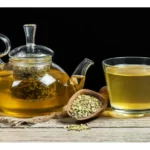
Thank you for this article! By following these web design trends, small businesses can create an effective and engaging website that helps them reach a larger customer base with a minimum investment.Hi Jessia, I never thought of having more than 1 logo, I kinda like that idea, thank you. I agree that brand is an every going task, it’s never done. Sort of like housework, you do it every day.
Your article helped me a lot, is there any more related content? Thanks!
Wow, fantastic blog format! How lengthy have you
been running a blog for? you make blogging glance easy.
The overall look of your web site is great, as smartly as the content!
You can see similar: e-commerce and here sklep internetowy